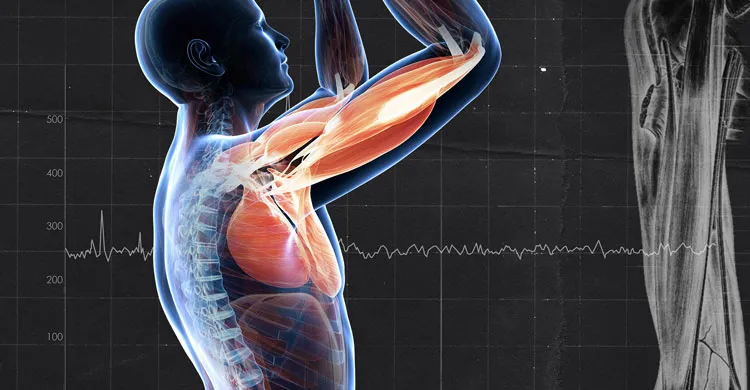Muscles, a major public health issue

Because muscles are a major public health issue, AFM-Telethon and the Institute of Myology, an international center of expertise on muscles and their diseases, are carrying out a project for a Myology Foundation. In addition, to raise awareness on myology among the public, they are launching two events dedicated to this public health issue in June 2023: the Muscle Conferences and Muscle Week.
Peeling a fruit. Typing in a code. Eating. Talking. Walking. Moving. Breathing... our movements and all our vital functions depend on the proper functioning of the 600 muscles in our body that make up 40% of our body mass.
"As patients with neuromuscular diseases know all too well, muscles play a vital role in motor, respiratory and cardiac functions. But they are also affected in many other diseases such as cancer or diabetes. In other words, the state of the muscles is an indicator of the state of health for everyone. Moreover, throughout life, muscles must be preserved and trained because they help fight against various diseases such as cardiovascular disease, prevent others such as osteoporosis, but also avoid musculoskeletal disorders, maintain memory, fight against the effects of aging ... And they are an essential reservoir of energy. Muscles are indeed a public health issue and must be recognized as such," says Laurence Tiennot-Herment, President of AFM-Telethon.
Because of its predominant place in the human body and its transversal role, muscles are at the heart of a discipline, myology, which should be taught and recognized.
To meet this major public health challenge, the AFM-Telethon and the Institute of Myology are carrying out, in the heart of Paris, a major project for a Myology Foundation whose objective is to study, diagnose, evaluate, and treat muscles, whether they are healthy, diseased, aging or trained.
The ambitions of the future Myology Foundation:
- A strong base: the Institute of Myology, combining different expertise around diseased muscles.
- A broader scope: muscles in all their states
- A foundation with a national dimension: an asset for the myological forces present throughout the country
- An international ambition with reinforced expertise
- A renewed attractiveness based on innovation and new partnerships (high-level technological platforms, start-ups, etc.)
- Muscles, a model organ, a source of therapeutic innovations
- A goal: to make myology known as a transversal discipline
"What we are going to build is based on expertise developed over the years. With our expertise in neuromuscular diseases, we have decided to extend it to muscles in all their states," explained Bertrand Fontaine, Medical and Scientific Director of the Institute of Myology, at a press conference organized by AFM-Telethon and the Institute of Myology on February 7.
"We want to defend the idea that muscles are a major public health issue. Muscles are not just tissues, they are organs with multiple functions. Over time, research is increasingly abundant and shows that muscles have a very transversal role and interact with other organs. This is a social and living-well issue. We want to take this message to the highest level," added Fabrice Chrétien, Director of the Neuromuscular Exploration and Evaluation Center at the Institute of Myology.
In addition, 2023 will be a year placed under the sign of muscles as the AFM-Telethon and the Institute of Myology launch two major events dedicated to this public health issue:
- The first "Muscle Conferences", on June 1, 2023, at the Economic, Social and Environmental Council. The aim of these meetings is to raise awareness of the public health issue represented by muscles among politicians, institutions, health, prevention and education stakeholders, as well as the world of work and sport.
- The first "Muscle Week", from June 1 to 7, is a public awareness event throughout France. Activities will take place throughout France to make everyone aware of the importance of muscles in our daily balance and how vital it is to preserve our muscle capital.
